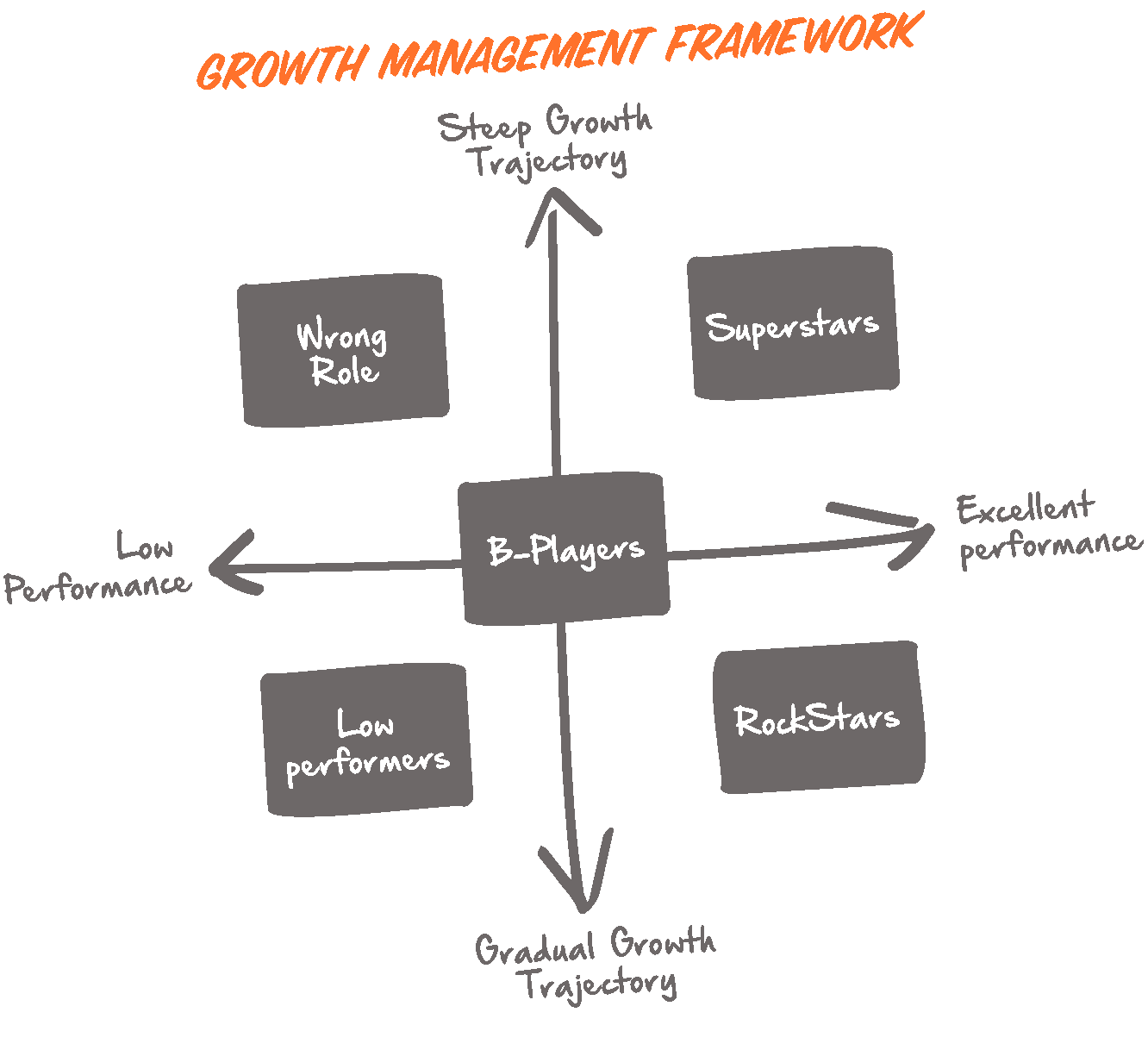📖Applauz Book Club is a series that outlines noteworthy ideas from popular books on the topics of work, HR strategy, and management. To see last month’s Applauz Book Club article, click here.
One of the biggest struggles of being a boss is balancing these competing priorities: results vs relationships.
What do I mean by that?
As a boss, you want to push your people to excel and produce great work. Yet, you don't want to be so demanding that you create undue tension or a toxic work environment.
In contrast, you also want people to like you. But you shouldn't be so concerned with relationships that you appear passive. Or worse, letting your team get away with subpar work or results.
Being a kick-ass boss without losing your humanity
In this 2017 book, author Kim Scott explains you don't have to choose between these two extremes. Jerk boss vs pushover boss is a false duality. Successful leaders have learned to live in a balanced middle ground. The solution lies in Radical Candor.
In this best-selling book, Scott takes readers through her "new management philosophy."
Scott has first-hand experience being a boss at the world's biggest tech companies. For example, she led AdSense, YouTube, and DoubleClick Online Sales & Ops at Google. She then joined Apple University to develop and teach a leadership course. Her book draws on her experiences leading and managing teams at these two tech giants.
In this summary, we will focus on the book's first sections. First covering her popular "Radical Cador" framework and then her "Growth Framework" for managing employee development. That said, the book offers other chapters filled with advice for being a great boss. If you are interested in learning more, you can buy the book here.
Build Radically Candid Relationships
Strong relationships drive leaders forward. Power in itself is empty and won't get you far. Scott repeatedly stresses this point – relationships are the core of your job as a boss.
Building close, caring relationships set the stage for people to do great work. "It's about giving a damn," she states. But it's not enough to care about people. To build trust, you also have to be willing to challenge people as well.
Scott bases her Radical Candor framework on two main facets: Caring Personally and Challenging Directly.
Care Personally: Personal care is about seeing employees as more than production units. Employees are whole beings (just like you!) with many needs and feelings. It goes beyond attitude, though; you must live it with actions. This means taking the time to speak frankly with your employee about their goals and aspirations. Many companies and their leaders already fail here, encouraging their people to stay "professional" and to sweep their emotions under the rug.
Challenge Directly: It may seem counter-intuitive, but to build trust, you must be willing to tell people when their work isn't good enough. Challenging people can create tension in the short term. But strong relationships rise out of that tension in the long term. That's because challenging people shows that you care enough to point out when things aren't going well.
When you are high in both Caring Personally and high in Challenging Directly, this is "Radical Candor." It's where you want to be!
But, if you find yourself low on Challenge Directly or Care Personally, you may slip into one of the other three parts of the framework.
Here they are in a nutshell.
Obnoxious Aggression: This happens when you are low on Care Personally but high on Challenge Directly. Scott states Obnoxious Aggression is the second-best thing you can do after being Radical Candid. At least people know where they stand so that a team can achieve results. To be clear: Scott believes excessive Obnoxious Aggression can be toxic. Particularly bosses who publicly belittle, embarrass, or ice employees out. Yet, she also says many managers fear being seen as a jerk. This fear leads them to overcompensate and fall into the two quadrants below.
Manipulative Insincerity: This happens when you are low on both Care Personally and Challenge Directly. Bosses fall into this group when they don't care enough to challenge their people. As a result, when they give praise or criticism, it's fake and doesn't reflect their true feelings. The motive is personal gain – for example, they want to be liked, gain a political advantage, or make their life easier. For instance, if an employee struggled with an assignment and the work was subpar. But the boss lies and tells them they did "a great job" to get them out of their hair.
Ruinous Empathy: This happens when you are high on Care Personally but low on Challenge Directly. Bosses fall into this category when they care too much. They are so concerned about peaceful relationships that they find it hard to challenge employees or hold them accountable. They create an environment of "toxic positivity" that feels pleasant but stagnant. Direct reports never know where they stand or have a chance to learn and grow. Praise can fall into this category too. This type of praise is surface-level and feels empty. There are only vague compliments and superficial "good jobs."
Moving Towards Radical Candour
After Scott presents the Radical Cador framework, she offers advice on how to put it into practice.
She asserts that many leaders are reluctant to get started with Radical Candor. As such, she offers practical tips that will help even the most skeptical leaders to start down the path to building a culture of Radical Candour. It's all about taking small steps forward.
Ask people to be radical candid with you: Opening yourself up to criticism from your team is the best way to set the stage for cultural change. First, this approach will warm up your team and get everyone used to being open and candid with each other. In short, it builds trust. And second, understanding how it feels to receive criticism will help you be better at giving it.
Start with radically candid praise: Giving praise can be easier than criticism at first. And Scott believes giving candid praise is just as powerful as criticism. Praise lets your employees know what they need to do more of; it guides them. To that end, the most impactful praise is specific, so it challenges them directly. Scott warns patronizing or insincere praise erodes trust just as much as overly harsh criticism.
Learn to walk the fine line: Reassuring someone you have confidence in them while simultaneously telling them their work isn't good enough is incredibly hard. You have to walk a fine line. Walking that line starts with building a strong relationship with each employee. You can't just dish out criticism and leave it, she states. You also have to show you're invested in helping the person improve. In other words, offer criticism, but above all else, be helpful.
 Understand What Motivates Each Person on Your Team
Understand What Motivates Each Person on Your Team
People are the engine of a team.
If your people perform poorly, your team's results will suffer, too. That's a no-brainer.
But according to Scott, many bosses fail here – they don't Care Personally or Challenge Directly enough. Instead, they slot people into boxes and leave them there.
Scott warns that this passive approach is risky. First, because people's ambitions are constantly evolving, and second, the main goal of any boss is to draw out the best performance from employees. This doesn't happen by accident; it happens by design. It takes effort.
In other words, a great boss should steer employees into roles and duties where they feel most engaged, motivated, and able to deliver their best work. To get there, you need Radical Cador.
In this chapter, Scott presents a "Growth Framework," which offers structure to this process. It categorizes employees into five groups based on their desire for career growth and work performance. Using this framework, bosses can identify where employees stand so they can guide them into roles which will allow them to perform at their best.

Here are the major takeaways from each category.
Rockstars: These employees deliver great work but are on a "gradual" growth trajectory. They are looking for consistency and stability in their careers. They have found something they are good at and want to invest time in mastering their skills. So they are looking to avoid taking on new challenges and opportunities.
Superstars: These employees deliver great work but are on a "steep" growth trajectory. Unlike Rockstars, they are hungry for new challenges, responsibilities, and opportunities. Scott warns it's vital not to "squash" these people's ambition. Help them seek advancement opportunities; even if it is not on your team, they will likely be your boss one day.
B-players: These employees deliver average work and are on a flat growth trajectory. Not very inspiring! But Scott believes B-player or "mediocre" human beings don't actually exist. So when employees fall into this category, she thinks this reflects a bad job fit. It's not that something is inherently wrong with the person. To that end, Scott believes letting employees trudge along this path is the height of Ruinous Empathy. Your job as a boss is to steer employees out of this limbo, especially if it's been more than 2-years since they've delivered something exceptional. It may even be necessary to find them a new position.
Wrong role: These employees are hungry for a rapid growth trajectory, but sadly their work quality and performance are lacking. When an employee finds themselves in this tricky category, Scott claims this because an employee is in the wrong role. Or it's a sign that an employee is simply overwhelmed. She calls this the "look in the mirror quadrant." When a boss puts someone in the wrong role or prematurely hands over new responsibilities, their poor performance is your fault. Now it's up to you to find them a better position or provide adequate training.
Poor performance: These employees have a negative desire to grow and whose performance is also subpar. If an employee has received negative feedback about their performance many times and shows no improvement, Scott insists, "you must fire the person." Most bosses wait too long before firing someone thinking things will get better. But keeping a low performer can affect a team's morale; it hurts those doing excellent work. In the end, you'll likely lose top performers if you keep low performers for too long.
People change, and you have to change with them
Scott optimistically thinks everyone can be great at something.
To be clear: Scott also notes that it's normal for people to have an "off" quarter or maybe even more. Life can get hard; no one can perform at max efficiency all the time.
Yet she truly believes in the right role; every employee can be a "Rockstar" or "Superstar." So when you notice an employee's ambitions or performance are cold and flatlining, it's your job as a boss to dig and figure out why. But most importantly, what you can do to help them thrive.
The worse thing any boss can do is hire someone, put them in a box, and leave them there. This careless approach is not only harmful to morale; it hurts your business's results.
Your employees' dreams, ambitions, and goals constantly evolve and change. To maximize your team's potential, you must Care Personally, which makes room for frequent open conversation. But you must also, Challenge Directly when the work falls below standard.
Think of Radical Cador as a tool. It allows you to harness your employees' skills and ambition to deliver the best results for your team and the entire company.
Final Thoughts
Once upon a time, bosses were expected to be detached and impersonal. Courtesy and professionalism were present, of course, but personal or emotional dialogue was largely absent from the workplace. Management was a means to an end.
Today, the primary goal of any boss is still to hit results. No one can deny that. But, Scott argues, work norms have drastically changed. Treating people as a means to an end is not the most effective way to maximize human potential.
To that end, Being a good boss means acknowledging humanity at work. Scott states, "emotional labour is not a part of the job; it's the key to being a good boss." In other words, bosses cannot be unfeeling robots to get the most out of a team. They must care.
By Caring Personally while simultaneously Challenging Directly, you can set the bar high without being an abrasive tyrant. Similarly, you can build close relationships without appearing "too nice." Striking this middle ground will allow you to steer people in the right direction. Ultimately, it will benefit them personally and the organization as a whole.
About the author
 Michelle Cadieux
Michelle Cadieux
Michelle is a content writer for Applauz. She holds a Bachelor's degree in Psychology from Concordia University, and she has been writing about work and employee happiness for over five years.



